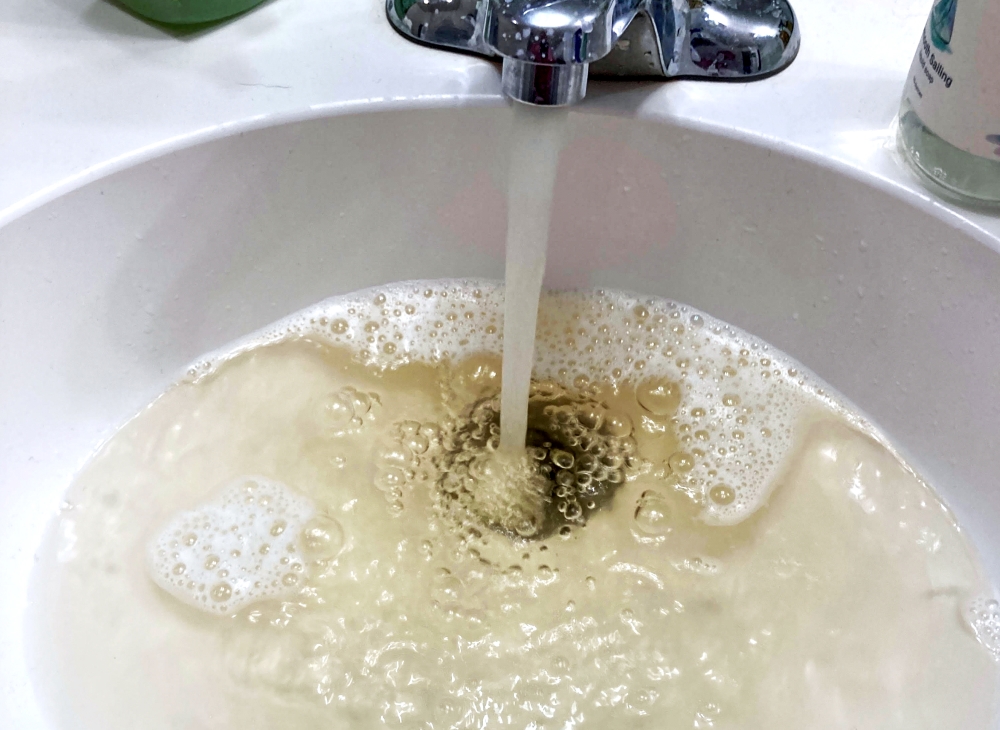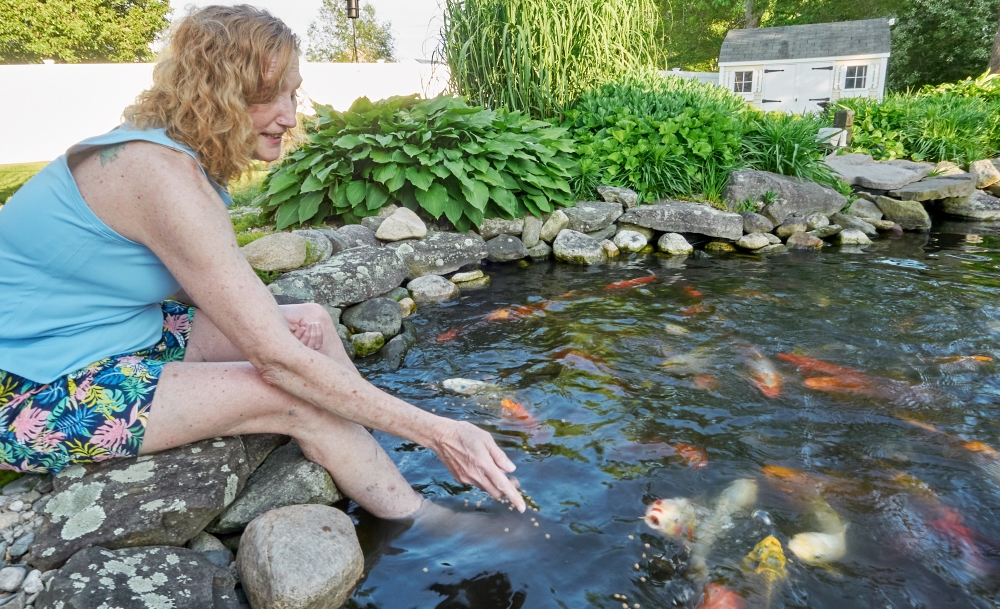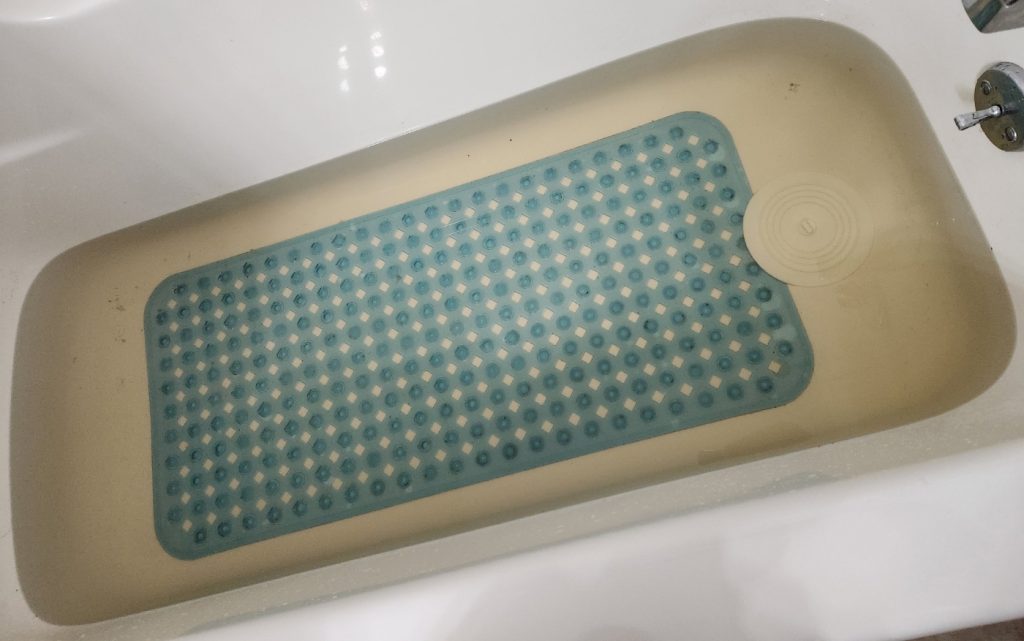Celeste Harrington, a Ponds of Plymouth resident since 2003, remembers when the water was fine.
“Until Aquarion,” she said. “You could drink it out of the faucet. It tasted good.” Now, however, her water is “sometimes brown,” Harrington said, and “it always smells like bleach.”
Other residents of the massive South Plymouth subdivision say similar things about the quality of their water, which comes from two wells operated by Connecticut-based Aquarion for the past few years.
Five Ponds of Plymouth residents who complained to the Independent about the brownish water and the chlorine smell all blame Aquarion for the problems. The company says the chlorine is needed to kill coliform bacteria and the discolored water is, in part, the result of neglect by previous operators of the system. The Massachusetts Department of Environmental Protection says it is working with Aquarion to find a solution.
The Ponds of Plymouth’s water history is complicated. When Harrington moved there, the water system was managed by Plymouth Water Company (which was not associated with the Town of Plymouth). In 2018, Colonial Water Company bought Plymouth Water, and in 2021, Aquarion bought New England Service Company, which owned Colonial.
“We used to rave about the water in the neighborhood,” said Harrington’s neighbor, Gail Doherty, who moved to Ponds of Plymouth in 2004. “Never had a problem. Never had filters on anything. It was great. But since this company has taken over, it’s been nothing but issues.”
Doherty first noticed the sporadically discolored water two years ago. It became a serious health issue for her family this spring, she said, when her husband had surgery that left a deep wound on his back. She said she asked a customer service representative at Aquarion whether it was safe for him to shower. She says the rep told her it was not. Her husband’s doctor prescribed antibiotics so he could safely shower, Doherty said.
Doherty last saw brown water on April 29, she said, and it continued “at least” until May 8 or 9. It was also brown on random days throughout the winter, she added.

Harrington said she gets brown water four or five times a year, mostly when Aquarion flushes the mains. It usually lasts four or five days, she said. Her water was last discolored on May 10.
A May 3 email from the company – which is a wholly owned subsidiary of Eversource – did little to reassure Ponds of Plymouth residents that their complaints will be assuaged anytime soon.
“Aquarion Water Company will be cleaning water mains in your area Monday through Friday, April 29, through May 16, between 8 a.m. and 3 p.m. so we can ensure that you continue to receive the highest quality water,” it said. “You may want to store tap water in the refrigerator ahead of time for drinking and cooking. And, if your water is discolored, delay washing clothes until it is clear. We appreciate your understanding and patience as we perform this important work.”
While the discoloration comes and goes, the odor does not, according to residents.
“It is awful,” Harrington said. “Every single day it smells like a pool.”
“You don’t want to shower in it,” she continued. “It doesn’t feel good. My skin is dry. My hair is dry. But the real issue is do you want to be ingesting that?”
Doherty said she doesn’t drink the tap water. Neither does her dog, who is “is drinking bottled water because she has dermatitis from the [tap] water.”
Doherty, too, said the chlorine smell is “all the time now.” It’s strongest when Aquarion flushes the hydrants, she said.
“I will not use it to cook,” she said. “The pasta crumbles. It falls apart.”

Another resident, Kerrie Studley, filed a complaint with Aquarion about the bleach smell on May 30.
“I went to fill my Brita [water filter] and it smelled like chlorine bleach,” Studley said. “Dry skin. Dry hair. My dog won’t drink it. I’m afraid to put it in my koi pond because it will kill them.”
When Studley watered her plants, she said, she noticed they looked “very sad.” She now uses a watering can, but lets the chlorine evaporate for a week first.
“Nobody ever had a complaint about the water” before Aquarion took over, Studley said. “We’ve been there 19 years, and the water was excellent.”
Studley said the last time her water was discolored was on May 5. The smell is periodic, she said. When Studley went to get her hair cut earlier this month, her stylist noticed her hair had a green tinge to it, even though she had not been in a swimming pool in years.
“We loved the tap water,” said Ashley Bennett, who said she moved to Ponds of Plymouth seven or eight years ago. Her assessment of what happened after Aquarion took over sounded a familiar refrain: “The water quality just plummeted.”
Bennett switched to a five-gallon drinking water dispenser after her stomach became upset. Her condition soon improved, she said. But if the water in the jug ran out and she used tap water to make her morning coffee, she said, she would feel ill.
“It smells like a swimming pool,” she said of the tap water. It even
rusted her chickens’ water feeder, she said.
But there are Ponds of Plymouth residents who appear satisfied with the quality of their water, including State Representative Matthew Muratore, who said he hasn’t fielded many complaints from neighbors.
“I’ve had some issues with not even a handful of people that have reached out to us about it,” he said.

It’s unclear why some residents say the water is intolerable, while others seem fine with it. But Ponds of Plymouth covers a lot of ground and has more than 800 homes. That means there are a lot of pipes, some in better condition than others. Its homes are all on septic systems, separate from the water distribution system.
The Planning Board and Conservation Commission approved the Ponds of Plymouth project in 1982. The promise of relatively large new homes at reasonable prices held appeal for growing families. The development expanded at a rapid pace. The developer at the time was New York-based Commonwealth Properties. There were several subsequent developers, the last of them Pulte Homes, which finished building it out in 2008.
Besides Ponds of Plymouth, Aquarion also provides the water for the Pinehills. The Independent has not received any complaints about the water in that development, which is considerably younger than Ponds of Plymouth.
Aquarion maintains previous companies didn’t keep up with needed maintenance of the Ponds of Plymouth water system.
“Because of that, there’s been a buildup of sediment and minerals in the water mains,” said spokesperson Peter Fazekas.
Fazekas said sediment and minerals are endemic to water mains, which must be flushed out periodically through fire hydrants. If the mains were not properly flushed over the years, he said, sediment could mix with the water. Sediment could also be stirred in summer when people turn on their sprinkler systems.
The discoloration is caused by iron and manganese that settles at the bottom of a main, Fazekas said.
The company performed a flushing last year and did another one from April until May 16 this year, Fazekas said. He said it might have looked bad at the time, but the process was productive.
“We were able to get a high volume of water through those water mains, which allowed us to get a lot of minerals out of the water mains,” Fazekas said. But if customers turned on their water during the flushing, he said, it would be discolored.
“When we’re doing a flushing, we won’t leave a hydrant until it’s running clear,” he said.
Aquarion is taking spot samples twice a week to make sure the water remains clear.
“We are not receiving phone calls at our customer service center from customers saying they have discolored water,” he said.
Doherty disputes that.
“I know five people on this street that have called,” she said.
As for that bleach smell, Fazekas said it’s because Aquarion chlorinates the water in all the systems it owns, something he said previous companies that provided water at Ponds of Plymouth did not do.
“It’s a low level of chlorine,” he said. He said from the time Aquarion started chlorinating in May 2023 to March of this year, the average level of chlorine in the water was .52 milligrams per liter, well below the 4 mg/liter allowed by the U.S. Environmental Protection Agency.
Prior to chlorinating, Fazekas said, 12 samples tested positive for total coliform bacteria, which it reported in its 2022 water quality report. The EPA requires all public water systems to monitor for the presence of total coliforms. The agency sets the maximum allowable level of total coliforms at zero, because there have been water-borne disease outbreaks in which researchers found very low levels of the bacteria, though the EPA also says coliforms are, with few exceptions, not harmful to humans.

A 2020 report from Colonial Water Company, the company that supplied water to Ponds of Plymouth before Aquarion, said the water comes from two groundwater sources, one between Kim and Lynn Circles and another on Lunn’s Way.
Edmund Coletta, a spokesperson for the Massachusetts Department of Environmental Protection, said the agency has received complaints about discoloration and the chlorine smell from residents of Ponds of Plymouth, typically when Aquarion flushes the system, and has forwarded them to the company.
“Since chlorine is an oxidant, and since iron and manganese is common in southeastern Massachusetts’ groundwater, the dissolved metals in the Ponds’ water are being oxidized and causing the problem of discoloration,” Coletta said.
He said the agency is working with Aquarion to resolve the issue and to determine possible sources of the problem and what steps to take to investigate it. As part of DEP’s oversight of Aquarion, Coletta said, the agency had the company increase its monitoring of iron and manganese to ensure manganese levels don’t exceed the EPA’s Health Advisory level of .3 mg/liter.
Fred Thys can be reached at fred@plymouthindependent.org.

